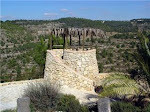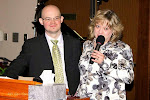I will make all My goodness pass before thee, and I will proclaim
the Name of the LORD before thee; and will be gracious to whom I will be
gracious, and will show mercy on whom I will show mercy.
And He said, Thou canst not see My face: for there shall no man see Me, and live.
Exodus 33:18-20
Jesus told Nicodemus, No man has seen God at any time; the only begotten Son, which is in the bosom of the Father, He has declared Him. John 1:18 He told the Pharisees, And the Father Himself, which has sent Me, has borne witness of Me. You have neither heard His voice at any time, nor seen His shape. John5:35 Paul was writing a letter to Timothy and began to worship the Lord in what was used in the early church as a worship song: Who only has immortality, dwelling in the light which no man can approach unto, Whom no man has seen, nor can see. 1 Timothy 6:16
God was very adamant in the giving His instructions to Moses not to make any graven image or any likeness of ANYTHING in heaven or in earth. He commanded them not to even cut the stones that they used to build their altars of sacrifice to Him. But we find God tabernacling Himself in human flesh that He might reveal His person to us through Jesus Christ.
In the beginning was the Word, and the Word was with God, and the Word was God. The same was in the beginning with God. All things were made by Him, and without Him was not anything made that was made. In Him was life; and the life was the light of men. And the light shines in the darkness; and the darkness comprehended it not. And the Word became flesh, and dwelt among us, (and we beheld His glory, the glory as of the only begotten of the Father,) full of grace and truth. John 1:1-5;14 And the Apostle Paul wrote to the Corinthian church: For God, Who commanded the light to shine out of darkness, has shined in our hearts, to give the light of the knowledge of the glory of God in the face of Jesus Christ. 2 Corinthians 4:4
How many times have I heard people ask why others don't believe? Paul told the Corinthians in the same chapter, as above mentioned: But if the Gospel be hid, it is hid to them that are lost: in whom the god of this world hath blinded the minds of them which believe not, lest the light of the glorious gospel of Christ, Who is the image of God, should shine unto them. 2 Corinthians 4:4 Notice that their minds were blinded. In Revelation chapter 3:17, the Lord tells the church of Laodicea, Because thou sayest, I am rich, and increased with goods, and have need of nothing; and knowest not that thou art wretched, and miserable, and poor, and blind, and naked... Jesus had commended the other six churches for their good works, but when it came down to this last church, He couldn't find one good thing to say about them. They were conceited and full of their own self. How much like this age we're living in. But we find in Revelation 3:20, that Jesus wasn't on the outside of His own church. They wouldn't even invite Him in. So, He called to the individual, If any man hear my voice, and open the door, I will come in to him, and will sup with him, and he with Me. It's like having a party or celebration in someone's honor, but not even inviting them to it.
Remember, at the last supper, they were sitting around the table and Phillip said, Show us the Father, and it will suffice us. John 14:8. If ever the Lord Jesus had been disappointed, I wonder if there wasn't some disappointment in His voice when He responded: Have I been so long a time with you, and yet have you not known me, Phillip? He that Has seen Me has seen the Father; and how then say you, Show us the Father? John 14:9 They didn't even recognize Who He was. But after He was crucified, resurrected, and came back in the form of the Holy Spirit, then John could boldly testify: For the life was manifested, and we have seen it, and bear witness, and show unto you that eternal life, which was with the Father, and was manifested unto us. 1 John 1:2 Paul told the church in Philippi: Who being in the form of God, thought it not robbery to be equal with God: but made Himself of no reputation, and took upon Him the form of a servant, and was made in the likeness of men: and being found in fashion as a man, He humbled Himself, and became obedient unto death, even the death of the cross. Wherefore God also has highly exalted Him, and given Him a name which is above every name: that at the name of Jesus every knee should bow, of things in heaven, and things in earth, and things under the earth; and that every tongue should confess that Jesus Christ is Lord, to the glory of God the Father. Philippians 2:6-11 He wrote to the church in Colossae: Who is the image of the invisible God, the firstborn of every creature: For by Him were all things created, that are in earth, visible and invisible, whether they be thrones, or dominions, or principalities, or powers: all things were created by Him, and for Him: And He is before all things, and by Him all things consist. Colossians 1:15-17 And writing to the Hebrews, he said: Whom He has appointed heir of all things, by Whom also He made the worlds; Who being the brightness of His glory, and the express image of His person, and upholding all things by the word of His power. Hebrews 1:2-3 Again, Paul wrote: For in Him dwells all the fullness of the Godhead bodily. Colossians 2:9
It is such a sad condition that the church is in, today. We don't even recognize the Prince of Glory. He is visible in the form of the Holy Ghost, but because of doubts and unbelief, Christians would rather be religious and take a form over the very Person of Jesus Christ. But I encourage you, dear reader, hear His voice. Open the door and invite Him to have communion with you and then constrain Him not to leave. Just as the two on the road two Emmaus constrained Him, saying, Abide with us: for it is toward evening, and the day is far spent. And He went in to tarry with them. Luke 24:29



